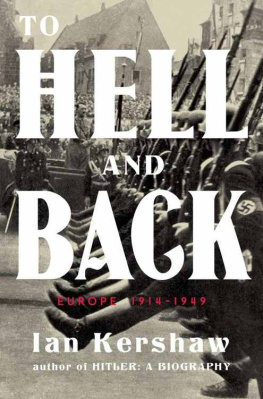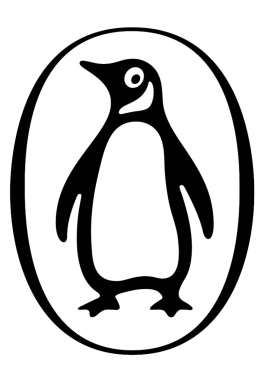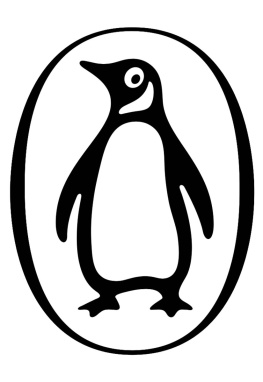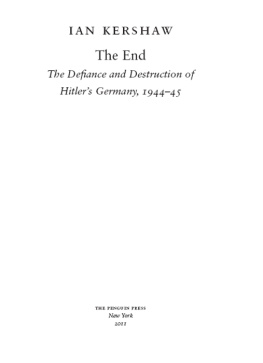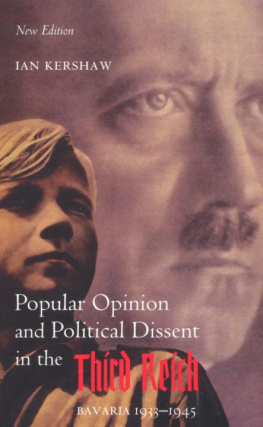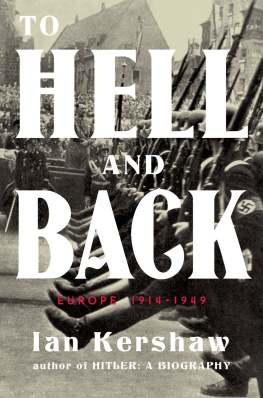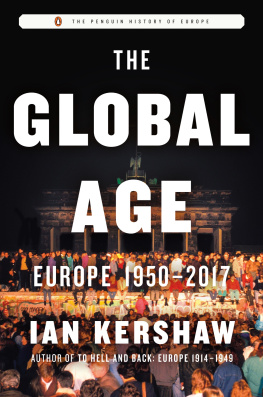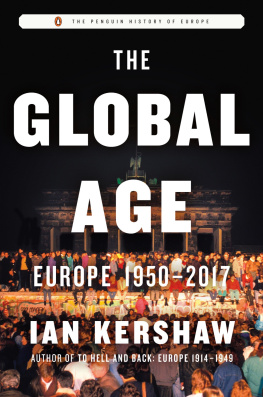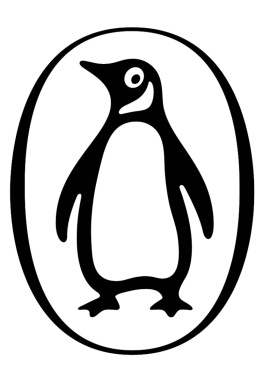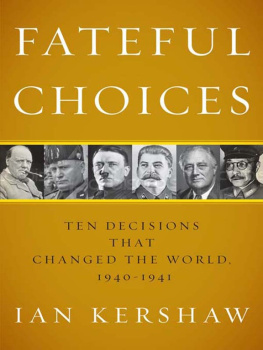THE PENGUIN HISTORY OF EUROPE
General Editor: David Cannadine
I. SIMON PRICE AND PETER THONEMANN: The Birth of Classical Europe: A History from Troy to Augustine *
II. CHRIS WICKHAM: The Inheritance of Rome: A History of Europe from 400 to 1000 *
III. WILLIAM JORDAN: Europe in the High Middle Ages *
IV. ANTHONY GRAFTON: Renaissance Europe
V. MARK GREENGRASS: Christendom Destroyed: Europe 15171648 *
VI. TIM BLANNING: The Pursuit of Glory: Europe 16481815 *
VII: RICHARD J. EVANS: The Pursuit of Power: Europe 18151914
VIII. IAN KERSHAW: To Hell and Back: Europe 19141949 *
IX. IAN KERSHAW: Fractured Continent: Europe 1950The Present
*already published

VIKING
An imprint of Penguin Random House LLC
375 Hudson Street
New York, New York 10014
penguin.com
Copyright 2015 by Ian Kershaw
Penguin supports copyright. Copyright fuels creativity, encourages diverse voices, promotes free speech, and creates a vibrant culture. Thank you for buying an authorized edition of this book and for complying with copyright laws by not reproducing, scanning, or distributing any part of it in any form without permission. You are supporting writers and allowing Penguin to continue to publish books for every reader.
First published in Great Britain by Allen Lane, an imprint of Penguin Random House UK
ISBN 978-0-698-41150-0
Version_1
Contents
List of Illustrations
. An Italian soldier seizes a Muslim flag from vanquished Ottoman troops near Tripoli, 1911. ( akg-images )
. A German caricature of belligerent Europe in 1914. ( akg-images )
. German troops on their way to the battle of the Marne in September 1914. ( akg-images/ullstein bild )
. The Ravine of Death, battle of Verdun, 1916. ( akg-images )
. A French poster proclaiming a Day of Serbia on 25 June 1916 to raise money for Serbian refugees. ( akg-images/Jean-Pierre Verney )
. The Earth in 1916 seen from the Moon. ( akg-images )
. A speaker from the German USPD addresses the crowd at a funeral on 29 December 1918. ( akg-images )
. A poster showing what Germans claimed Allied demands at the Treaty of Versailles would mean for Germany. ( akg-images )
. French suffragettes in 1919 demanding the vote. ( Fox Photos/Getty Images )
. German propaganda during the Upper Silesian Plebiscite Campaign in 1921. ( Universal History Archive/UIG via Getty images )
. A British tank in Cologne, c . 1920. ( akg-images )
. Signatures of those who negotiated the Treaty of Locarno in 1925. ( akg-images/picture-alliance/dpa )
. A Kulak family is expelled from its farm in Ukraine. ( akg-images/RIA Nowosti )
. A poster advertising the UFA-Palast cinema at Wilhelmshallen am Zoo, Berlin, c. 1930. ( akg-images )
. The Karl-Marx-Hof, Vienna. ( ullstein bild/ullstein bild via Getty Images )
. A Nazi election rally in Frankfurt am Main, probably 28 July 1932. ( akg-images )
. A guard standing outside the Karl-Marx-Hof in Vienna after a socialist uprising on 12 February 1934. ( ullstein bild/ullstein bild via Getty Images )
. Fascist propaganda for the Italian election of 26 March 1934. ( Keystone-France/Gamma-Keystone via Getty Images )
. Spanish troops in Africa awaiting their flight home in a Junkers-52 supplied by Nazi Germany, August 1936. ( akg-images/ullstein bild )
. Polish men under German guard in Autumn 1939. ( akg-images )
. Members of a German propaganda company taking photos of abandoned British war material, Dunkirk, May 1940. ( akg-images )
. London citizens taking shelter in an underground station during an air raid, 7 October 1940. ( akg-images )
. A recruiting poster for the Norwegian legion of the Waffen-SS. ( akg-images )
. German, Italian and Hungarian soldiers taken captive by the Red Army in early 1943. ( akg-images )
. Prisoners in the concentration camp at Mauthausen in Austria in 1943. ( akg-images/ullstein bild )
. Anti-Bolshevik propaganda poster for the service of obligatory labour ( service du travail obligatoire ) in France, 1944. ( Art Media/Print Collector/Getty Images )
. Italians watching American tanks pass by the Colosseum after the liberation of Rome on 4 June 1944. ( akg-images/Universal Images Group/SeM )
. Warsaw in ruins at the end of the Second World War. ( akg-images/Universal Images Group/Sovfoto )
. Sudeten Germans near Liberec (Reichenberg) in Czechoslovakia, 6 May 1946. ( Sovfoto/UIG via Getty Images )
. A poster advertising the Marshall Plan. ( Archiv Gerstenberg/ullstein bild via Getty Images )
List of Maps





Acknowledgements
A book like this depends more than most on the suggestions and encouragement of others sometimes without them being aware of how they were helping. In a variety of ways I am grateful to: Joe Bergin, Richard Bessel, John Breuilly, Franz Brggemeier, Chris Clark, Paul Corner, David Dilks, Christopher Duggan, Richard Evans, Detleff Felken, Jrgen Frster, Norbert Frei, Elke Frhlich, Mary Fulbrook, Dick Geary, Robert Gerwarth, Christian Gschel, Mike Hannah, Joe Harrison, Julia Hoffmann, Dov Kulka, Eberhard Jckel, Margit Ketterle, Peter Liddle, Klaus A. Maier, Michael Mann, Andy Marrison, members of the Cambridge Modern History Seminar, Hans Mommsen, Bob Moore, Irene Nielsen, Frank OGorman, Peter Pulzer, Aron Rodrigue, Mary Vincent, George Wedell, Hans-Ulrich Wehler, Frieder Weitbrecht, Charlotte Woodford, Hans Woller, Jonathan Wright and Benjamin Ziemann.
I am indebted to Gerhard Hirschfeld for sending me the outstanding and authoritative encyclopaedia of the First world War which he co-edited (and which has subsequently appeared in a splendid English edition). Bernt Hagtvet was more than kind in supplying me with two extremely useful and informative volumes which I had not come across and deserve to be better known: the collection of essays edited by Dirk Berg-Schlosser and Jeremy Mitchell on the crises of democracy in inter-war Europe, and that by Stein Ugelvik Larsen on the transition from fascism to democracy after 1945. Im also grateful to Norman Davies, who pointed me towards a number of first-hand accounts of events in Poland, including the fascinating memoirs of a village mayor, Jan Soma, and to Andreas Kossert for further references to Polish sources.
I owe special gratitude to a number of people for their critical commentaries on the text. Beverley Eaton erased many typographical errors. Traude Spt made some excellent suggestions (and she and Ulrich provided their usual generous hospitality on my stays in Munich). At an expert level I owe warm thanks for their valuable points of constructive criticism to David Cannadine (general editor of the Penguin History of Europe series), Laurence Rees and Nicholas Stargardt. And when the drafts were complete, Richard Mason proved a splendidly meticulous copy-editor.
As on earlier occasions it was a pleasure to work with the excellent team at Penguin. Simon Winder was as always an exemplary editor. He and Maria Bedford were also a great help in researching and helping to select the pictures, while Richard Duguid oversaw the production with his customary efficiency. My thanks, too, to Auriol Griffith-Jones for her skilful compilation of the index. I am grateful as ever to Andrew Wylie, a literary agent sans pareil , and at the Wylie Agency in London to James Pullen and Sarah Chalfant for unfailing help and advice.
Next page
